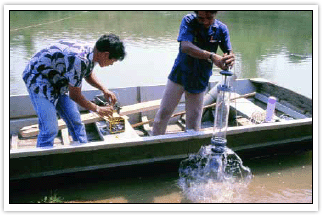2005 Progress Report
Environment Programme
The work of the Environment Programme assists the Mekong River Basin member countries to ensure sustainability of development by protecting and maintaining the ecological balance of the basin and minimising negative impacts from development and uses of water and related resources.
It also assists the other MRC programmes by generating data, information and knowledge for decision-making, and it supports the BDP process by offering advice and promoting cooperation among environmental agencies.

The programme has five components:
- Environmental Monitoring and Assessment
- Environmental Decision Support
- People and Aquatic Ecosystems
- Environmental Knowledge
- Environmental Flows Management
The Environment Programme is now into its 2004-2008 programme cycle and is expanding its fields of study and its support to MRC's other programmes.
Key work in 2005 included an assessment of the Mekong River Basin through an Indicative Basin Report Card on environmental conditions. The programme is also now working to finalise guidelines for a Transboundary Environmental Impact Assessment System. A five-year initiative on environmental flows assessment started in 2005.
During 2005 the programme achieved the following
- The production of the technical document for an Indicative Basin Report Card on environmental conditions, which draws on results of basin-wide monitoring and assessments. The Report Card, to be finalised in 2006, will present an overall view of the Mekong River Basinís health. In late 2006, the Programme is also planning to prepare a Basin Report Card incorporating social and land-use issues.
- The development of guidelines for a Transboundary Environmental Impact Assessment System. It is envisaged these guidelines will be approved in 2006 following the acceptance of the detailed content by the four MRC member countries.
- Regular monitoring of the basin's ecological health began in 2005 with completion of assessments for the upper part of the Lower Mekong Basin as well as in the Sekong/Srepok/Sesan River basins. The results were released at the Annual Technical Meeting in November 2005. In 2006 the flood plain and the delta will be covered, and in 2007 the monitoring cycle completed by covering Northeast Thailand and Central and Southern Lao PDR.
- The completion of a year-long study (June 2004-May 2005) on the water quality of the Sesan River including a final report.
- Completion of a study and analysis of available sediment and sediment transport in the basin. Several recommendations will be followed up in 2006.
- Commencement of studies on environmental flows. The first fieldwork and workshop for the Environmental Flows Assessment supporting the Integrated Basin Flow Management (IBFM) initiative was conducted jointly with the Water Utilisation Programme (WUP) team in May 2005. After analysis a week-long workshop in November 2005 consolidated the results from over 20 experts in a report on the initial assessment of the environmental, economic and social consequences of flow changes in the Mekong River.
- The completion of a preliminary basinwide map of wetland types as well as a database for handling all wetland-related data. This work contributes to the programme's ongoing investigation into economic valuation and people's vulnerability and dependence on aquatic resources and is part of its contribution to the Mekong Wetlands Biodiversity Programme (a joint programme with IUCN and UNDP).
- Production of key information and reference materials for identifying aquatic invertebrates.
- Production of the Environmental Training Kit in five languages (English, Khmer, Lao, Thai and Vietnamese) on CD.
- The Programme's Second Annual Technical Meeting was held in November 2005 and the proceedings are available on CD.
- Initiation of a study on environmental impacts of tourism. This assessment will include an analysis of the MRC's comparative advantage in tourism, allowing for future programme development.
As part of its on-going river evaluation work, the Environment Programme is producing a technical report on its biological assessment of the river system (2004 basin-wide assessment). This will be the first ever attempt to characterise the condition of the river using biological indicators.
The programme will also undertake important work to strengthen the framework of transboundary management. Mechanisms will be initiated for addressing environmental conflicts, and environmental governance will be promoted in the NMCs and MRCS.
Work on environmental flows (IBFM Phase 3) will continue with specific studies addressing knowledge gaps identified under IBFM Phase 2. The Programme will also assist WUP with the development and implementation of the Integrated Water Quality Management Strategy.
Choose a newsletter: